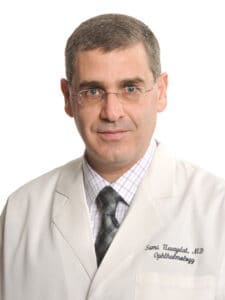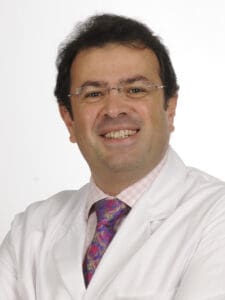Fellowship Details

Sami Uwaydat, M.D.
Dr. Sami Uwaydat is a vitreoretinal specialist with experience in genetic retinal diseases. Dr. Ahmed Sallam is a vitreoretinal and uveitis specialist and is also involved in pediatric retinal diseases. The fellowship spans two years, with the clinical exposure mainly based at the Harvey & Bernice Jones Eye Institute with some exposure at Arkansas Children’s Hospital.
The Vitreoretinal and Uveitis Services are by far the busiest services at the JEI and at the VA. We average 10,000 patient visits/year, 600 major surgical procedures/year, 2500 in clinic procedures/year (injections and lasers). We are a tertiary referral center for patients with ocular trauma, uveitis and retinal dystrophies from all over Arkansas.
During the fellowship, the fellow will be trained for a clinical and an academic career. The fellow will learn to manage a variety of retinal and vitreous conditions including retinal detachment, retinal vascular diseases, macular diseases, retino-choroidal degenerative and hereditary diseases, posterior uveitis, and ocular trauma.

Ahmed Sallam, M.D., Ph.D., FRCOphth
By the end of fellowship, the fellow is expected to become proficient in the medical and surgical management of uveitis including treatment with systemic immunosuppressive medications and chorioretinal biopsy. The fellow will gain experience through participation in surgery, both as the operating surgeon or the assistant depending on case complexity, examination of patients, and discussion of management plans as well as didactic teaching and analysis of pertinent literature. The Vitreoretinal Service is very active in ocular simulation and has both the cataract and vitreoretinal surgery capabilities for the Eyesi high tech virtual simulator. Patient facilities at the Jones Eye Institute are equipped with state-of-the-art ophthalmic diagnostic and therapeutic tools: Zeiss OCT 5000, Heidelberg Spectralis, Optos California, Pascal laser, Navilas laser, LKC ERG machine as well as a surgical endoscope, intraoperative OCT, and 3D Ngenuity in surgery. At the completion of the training, the fellow should become well versed in the interpretation of retinal diagnostic tests including fluorescein, ICG, OCTA and ERG, and is encouraged to become familiar with how to perform most of these tests.
The very high volume of patients will provide extensive experience in all aspects of surgical retinal disease including complex diabetic vitrectomy and PVR. Responsibility will be allocated in a graded fashion, and a skilled surgeon can expect to perform a large number of surgery of up to 600+ PPV, 50+ scleral buckle, 100+ complex anterior segment surgeries related to trauma, and more than 250 retinal laser procedures.
Education and Research
The fellow is required to actively participate in grand rounds, ethics lectures and journal clubs as well as the education of medical students and ophthalmology residents.
The fellow is expected to contribute at least two manuscripts every year. Presentations at national meetings are highly encouraged. Attendance of one national meeting every year will be funded by the Department of Ophthalmology. Further meetings can be funded based on research contributions.
Requirements
- Completion of an Ophthalmology residency
- Eligibility for a medical license (educational or unrestricted) per the Arkansas State Medical Board.
For further information, please refer to the Arkansas State Medical Board website. Applicants requesting H1B sponsorship should pass the USMLE 3 prior to applying.
